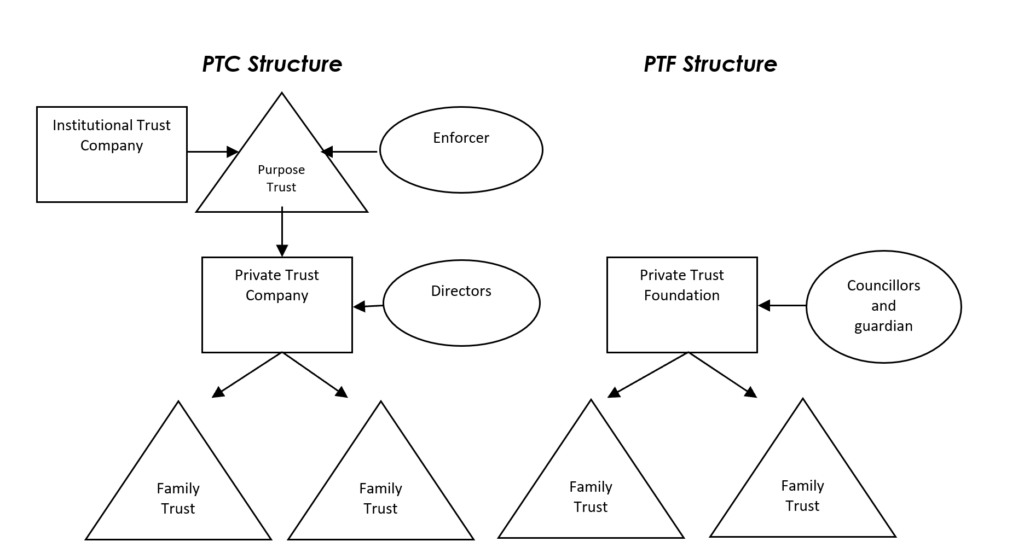Establishing an effective Offshore Trust that is both operationally sound and achieves the Settlor’s objectives is of paramount importance, but can be fraught with pitfalls. As a Trust service provider we often find that Settlors and individual Trustees can have misconceptions about their roles, responsibilities and the Trust itself. These misunderstandings can culminate in issues and create unintended liabilities. This series has considered the key elements of Offshore Trusts; If you would like to read the other articles in the series you can find them here:
In the final article in this series, we will examine the most common misunderstandings and pitfalls for Settlors and Trustees to be aware of. Where appropriate, we suggest some best practices for avoiding future problems and how a Trust service provider can help. We will be discussing:
The Nature of the Legal Arrangement
On the subject of Trusts generally, it is important to note that Trusts do not have separate legal personality and therefore do not benefit from limited liability. It is the Trustees who are liable for any actions taken, or not taken, in respect of the Trust.
Often Settlors will either not be aware or overlook the basis of the legal arrangement – the transfer of beneficial ownership – this confers legal title onto the Trustees; the Settlor will no longer have any legal title to the settled assets. To continue to exercise control, as previously, will most likely result in the Trust being deemed a sham and therefore voidable.
Following this, there is also a common misunderstanding that the role of Trustee is simply ceremonial, purely an administrative requirement. Of course, this is not correct. The Trustees have a fiduciary duty to any named or class of Beneficiaries, to manage the Trust Fund in good faith, in line with the Trust Deed. As noted above, they hold legal title over the assets of the Trust. As legal owners, the Trustees are liable for tax due on the Trust assets, which may arise in jurisdictions other than their local jurisdiction of residence.
Subject to Tax Advice
Often, and understandably, clients that come to us directly are not aware of the significant changes in reporting, compliance requirements and the general approach to tax planning and anti-avoidance measures. These changes have made tax advice a necessity from outset. Such advice ensures that, where best practices are followed, business is conducted bona fide and is globally compliant.
The Perception of ‘Offshore’
This neatly leads us to our next common misunderstanding. The level of negative media coverage that Offshore structures have received over the last decade is unfortunate and often disproportionate or even misleading. For example, some of the most recent and prolific stories, the Panama Papers, Paradise Papers and Pandora Papers, all present the use of Offshore planning as immoral or even criminal – whilst the reports do highlight a minority of offenders, 95% of the leaked documents will have related to wholly legal and compliant planning, that is commonplace.
In fact, to use the UK as an example, it is mandatory for UK employers to provide a minimum 3% private pension contribution to employees. Those pensions will more than likely be linked to non-UK domiciled funds. 75% of UK households are directly or indirectly engaged in such asset management services and therefore many UK residents will already have some form of offshore involvement.
Hopefully the above example briefly illustrates the point I am driving towards; to many people, the word Offshore, especially in the context of wealth management, is synonymous with scandal. When, in reality, Offshore is omnipresent – it is the norm, wholly legal and it is almost always advised by highly qualified and regulated intermediaries. In summary, going Offshore should now be a transparent and compliant tool for sophisticated planning, which can lead to legal, tax and various other benefits. Offshore should not be seen as a shortcut to tax evasion or hiding wealth.
One Size Does Not Fit All
Finally, many UK resident and domiciled individuals are unaware of the various rule changes and subsequent erosion of various tax benefits, which previously flowed from the use of Offshore Trusts. Therefore, for many in the UK who are resident and domiciled, there are little to no benefits associated with using an Offshore Trust. The limited benefits can include the regulated nature of Isle of Man Trustees and the ability to benefit from gross roll-up, in certain circumstances.
Unlike Trustees in many other jurisdictions, providing Professional Trustee services is a licensed activity on the Isle of Man. Isle of Man Trustees require a Class 5 License from the Isle of Man Financial Services Authority, and are therefore properly regulated – ensuring that good levels of governance and compliance are followed and informed trustee actions. In addition, due to its illustrious heritage in Trust planning, both the Island and Dixcart have extensive expertise in this area.
Gross roll-up describes an offshore structure’s ability to benefit from untaxed compounded growth for the duration of its lifetime. Offshore Trusts may benefit from gross roll-up in certain circumstances – this has to be caveated as there may be tax to pay on establishing the Trust, periodically (e.g. on 10 year anniversaries), in respect of any distributions, on settlement etc. The taxation of Trusts is complex and will require specialist advice to consider your circumstances. however, there can still be many benefits to using Offshore Trusts for UK Resident Non-Domiciliary individuals.
Offshore Trusts – Common Pitfalls
There are many issues that can be avoided by proper planning and expert guidance from outset. Some of the most common considerations include:
The Trustees are mandated to follow the provisions of the Trust Deed; contravention of this can lead to legal action being taken against them for breach of fiduciary duty. Therefore, the Settlor needs to foresee the Trusts requirement for flexibility, ensuring that it is not blinkered in the approach to achieving its objectives, or ties the Trustees’ hands regarding effective management of the Trust.
There are several scenarios where an overly prescriptive Trust Deed can cause unintended issues. We will examine some brief examples below.
Distributions: Where, for example, the Trust Deed stipulates that a distribution or distributions are to be made to a Beneficiary on or following a certain milestone (e.g. upon a birthday, marriage, purchasing a first home, graduation etc.), the timing may not always be ideal as circumstances change. For instance, vulnerable or young Beneficiaries receiving a sudden windfall could lead to negative impacts/outcomes.
Further to this, where the distribution schedule is fixed, this can cause unintended tax consequences. Beneficiaries are taxed on distributions received, taxable at their personal rate in their jurisdiction of residence. If the Beneficiary’s income falls into a higher or additional rate of tax at the time of transfer, this can lead to the payment of unnecessarily high tax. Rather, given the flexibility, the Trustees could defer the payment until they either take tax advice or fall into a lower bracket e.g. on retirement, etc.
Asset Selection: It is not unusual for the Trust Deed to name or preclude certain types of activity regarding the management of the Trust fund. For example, it would be perfectly logical to limit the level of risk exposure to certain assets/activities owing to volatility – e.g. Bitcoin investment. On the flipside, where certain investments are specified, this can be far too restrictive and cause various longer-term issues – e.g. what happens if the fund or company specified ceases to trade?
Solution: Discretionary Trusts offer the Trustees complete control over how the Trust achieves its aims. The Settlor can still provide some guidance via a Letter of Wishes, which is persuasive but not binding. As long as the Letter of Wishes is reviewed regularly, the Trustees will be aware of the Settlor’s changing intentions and take this into account when taking any actions. In addition, Isle of Man Trusts can now continue in perpetuity, which provides additional flexibility when estate planning. Dixcart have significant experience in establishing and administering Offshore Discretionary Trusts.
As I am sure you can appreciate by now, the choice of Trustee is extremely important. Several factors need to be considered when choosing who performs this vital role:
Longevity: A key consideration when appointing Trustees is their longevity – will the selected Trustee be able to fulfil their duty for the lifetime of the Trust? If not, you will have to consider succession planning to replace those Trustees as and when they pass away or lose capacity. Longevity also applies to the Trustees’ tax residency i.e. If the Trustee is living in an Offshore jurisdiction, but then moves to the UK, the Trust will also move with the Trustee and could be liable to UK taxation. The Settlor needs to ensure that the Trustee will provide continuity and stability.
Expertise: Depending on the assets held in Trust, or the activity undertaken, there may be certain expertise required to meet the Trust’s objectives. For example, when managing assets such as investments, the Trustees will have to be comfortable dealing with the assets, their administration and any third party professionals involved. This also extends to knowledge of the Trust, as well as the legal and regulatory requirements.
Liability: As noted previously, the Trust does not benefit from limited liability, and therefore the Settlor will need to take the potential risks e.g. litigation etc. into consideration when selecting who to appoint as Trustee. The tax aspects are also worth considering here, as mentioned above, the Trustees will be liable for any due tax on the assets. Therefore, the Trustees will need to be willing and able to perform the role and understand the implicit risks of the undertaking.
Protectors: In many respects Protectors police the Trust, in theory providing a stopgap to wayward Trustees. In practice, giving a third party too much say in how the Trust is run, can make administration of the assets onerous and potentially negatively impact its objectives. Further to this, where a Protector is given too much scope, they can be deemed a de facto co-Trustee, and therefore beholden to the same fiduciary duties and liability as a Trustee. Where a Protector is desirable, ensuring that their powers are narrowly defined is vital to ensuring they add to rather than detract from the objectives of the Settlor.
Alternates: Where the Settlor has appointed an individual to act as Trustee, this can cause issues further down the line. Where the individual is the sole Trustee, if they pass away without making proper provision, there can be unintended burden and unwarranted cost involved in remedying the situation. Where individual Trustees are desirable, you must ensure that a minimum of two are appointed at all times, and ideally provision made for replacement within the Trust Deed to protect against unforeseen events.
Neutrality: Where family members are appointed as Trustees, it is not uncommon for relationships to faulter and communication to breakdown. Such issues can present significant administrative barriers, potentially affecting the Settlor’s intended outcome.
Solution: All of these issues can be abated via the appointment of a professional Trustee rather than individual Trustees. Professional Trustees, such as Dixcart, can provide an unbiased and expert service for the lifetime of the Trust. Using their technical knowledge and adhering to best practices, they can administer the Trust effectively and efficiently, reducing the burden placed on both the Settlor and their loved ones. And as previously noted, unlike in some other jurisdictions, professional Trustees located in the Isle of Man are licensed and regulated – so you can rest assured that the Trust is in capable hands.
It is understandable that Settlors may wish to retain control over the Trust assets for as long as possible; after all, they have more often than not spent a lifetime accumulating the wealth they want to pass on. Some may even seek to appoint themselves as Trustee, however, too much involvement from the Settlor can lead to the Trust being deemed a sham, and therefore the Trust assets could form part of their estate for tax purposes. It is worth underlining the fact that there needs to be clear separation between the Settlor and the assets, ensuring that the Settlor cannot be deemed to have retained any unintended beneficial interest.
A Settlor may also wish to name themselves or their spouse as beneficiary, however, this requires very careful consideration. If the Settlor or his or her spouse can benefit in anyway, the Trust is deemed to be a Settlor Interested Trust, giving rise to adverse tax consequences.
Solution: The Settlor needs to be clear about what they want to achieve from outset. This way, the correct form of Trust and appropriate provisions can be included at planning stage. The client will need to work with the adviser to come to a decision. Referring to my note above, regarding professional Trustees, this can also provide comfort. The Settlor should be able to have confidence that their chosen service provider will always act in the interests of the Trust, taking into consideration the Settlor’s Letter of Wishes where appropriate.
The selection of Beneficiaries needs to be carefully thought out – sometimes it is immediately clear who should benefit, and other times it can be a ‘Sophie’s choice’ dilemma. Of course, the choice will be directly influenced by the type of Trust being setup i.e. in the case of a Discretionary Trust, specific Beneficiaries or classes of Beneficiaries are selected for the Trustees to determine who should benefit. In addition, the Settlor must choose whether or not to make Beneficiaries aware of their interest in the Trust. Depending on the type of Trust, a Beneficiary can have a legal right to the assets held in Trust or information about them. Additionally, the Beneficiary can have a tax liability in certain circumstances.
Solution: This needs to be considered on a case-by-case basis and will very much depend on the Settlor’s personal circumstances. It can be very useful to either make the Beneficiaries aware, so that open discourse can be had between Trustee and Beneficiary, or alternatively in some cases retaining privacy in this matter until time of distribution may be preferrable – note that depending on the constitution of the Trust, the Beneficiary may have an immediate tax liability, and therefore would need to be immediately notified. Either way, the level of communication desired can be facilitated by professional Trustees, such as Dixcart.
Before establishing the Trust, the Settlor needs to take the costs of administering the assets into account – whether this is for trading investments, the procurement or sale of property, potential tax consequences, professional services, etc. An additional consideration will be the impact of increased regulatory and compliance reporting required in today’s world – this means that administering an Offshore Trust is no longer an exercise that incurs nominal fees.
Solution: Whilst fees can be paid from an alternative source i.e. outside of the Trust fund, this can provide operational issues. For example, where the Settlor was paying the operational costs of the Trust and the Trust continues after death, alternative provision must then be made for the fees to be met. It is often far simpler to apportion a percentage of the Trust fund to cover the administration in achieving the objective of the Trust. In prosperous times the growth of the Trust Fund often more than covers these costs – however, in times of low interest, depressed markets or even depending on the assets held, such fees must be seriously considered in light of the Trust Fund’s sustainability. Such costs should be illustrated by service providers on receipt of the full details.
Working with a Trust Service Provider – Dixcart
Dixcart have been providing Trustee Services and guidance for over 50 years; assisting clients with the effective structuring and efficient administration of Offshore Trusts.
Our in-house experts and senior employees are professionally qualified, with a wealth of experience; this means we are well placed to support and take responsibility for the Offshore Trust, acting as Trustee and providing specialist consultancy services where appropriate. If required, the Dixcart Group can also assist with individuals seeking to immigrate to the UK and the required tax and wealth planning.
We have developed an extensive range of offerings, which includes an array of Isle of Man structures. From pre-establishment planning and advice to the day-to-day management of the vehicle and troubleshooting issues, we can support your goals at every stage.
Get in touch
If you require further information regarding the use of Offshore Trusts, or Isle of Man structures, please feel free to get in touch with Paul Harvey at Dixcart: advice.iom@dixcart.com
Dixcart Management (IOM) Limited is licensed by the Isle of Man Financial Services Authority.












